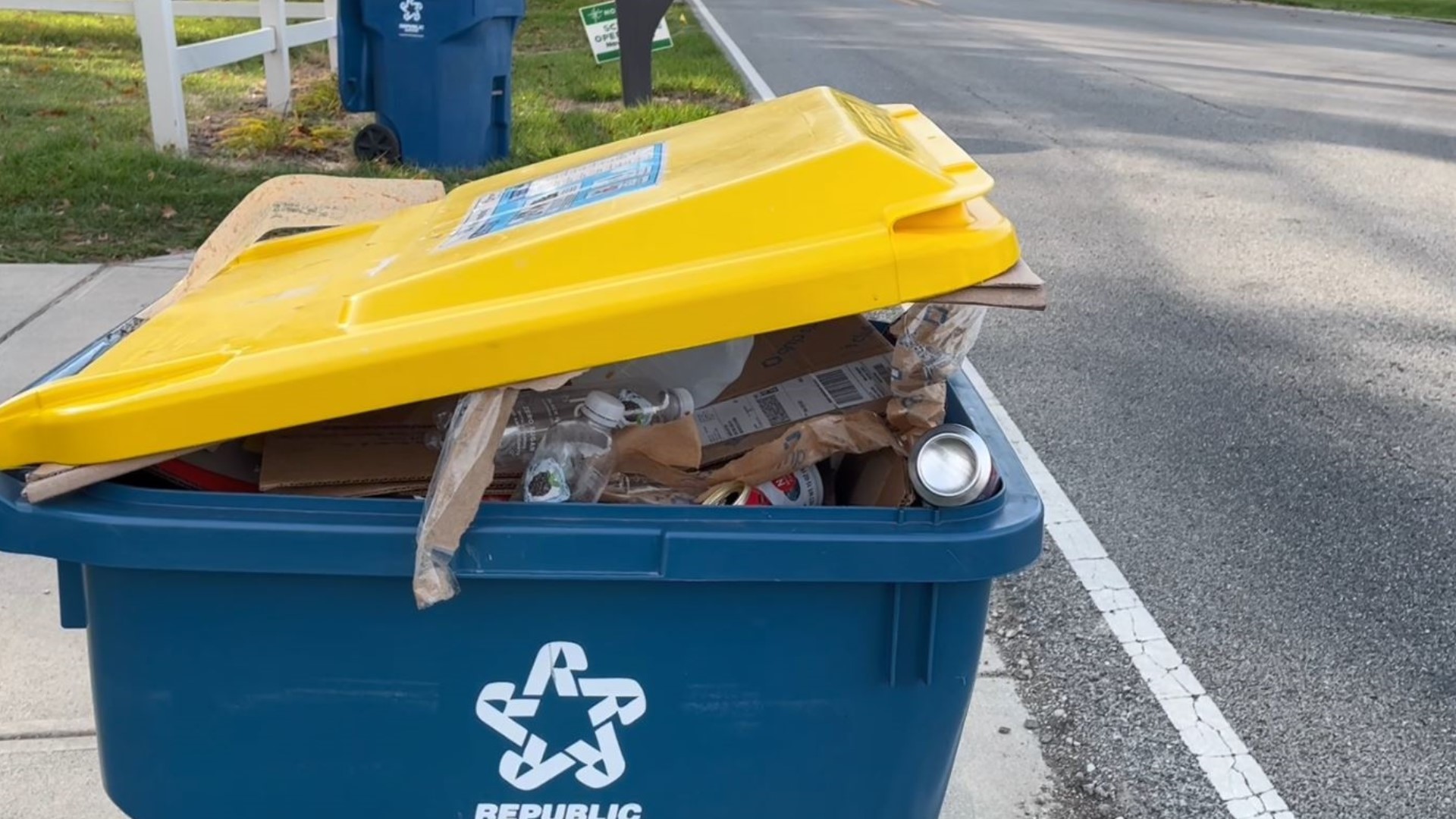INDIANAPOLIS — When you roll your cans, bottles and carboard out to the curb to be recycled, where do they actually go? That’s the question the 13News VERIFY team receives more than any other.
“How much of our city’s recyclable materials is actually recycled? Or are these materials placed in a landfill along with the garbage?” asked Laurie Cuellar.
“Does Republic really recycle plastic or burn it or does it just end up in a landfill?” echoed Jan Prichard of Fishers.
“I have heard that 90% of all recycling goes directly into the landfills … If this is true, then why do we pay for recycling services?” wrote Scott Stoeffler.
Those are among dozens of emails sent to 13News from WTHR viewers, who often cite posts on Facebook, TikTok and other social media platforms that claim curbside recycling does not truly get recycled.
With nearly 250,000 families in the Indianapolis metro area participating in curbside recycling programs - according to statistics provided by Waste Management and Republic Services, the two largest curbside recycling companies serving central Indiana - recycling is a big business with a lot at stake. Those two companies pick up hundreds of millions of pounds of recyclable materials in and around Indianapolis each year.
So where exactly does that material go? And is it really getting recycled or is it simply destined for a landfill?
For the past three months, 13 Investigates has been tracking curbside recycling to find out. What 13News discovered during the undercover investigation might make you think twice about what you put in your recycle bin.
How we tracked the recycling
13 Investigates worked with local families to track their curbside recycling, utilizing both undercover surveillance and technology to follow recyclable materials from curb to destination.
On each family’s recycle day, 13News placed an electronic tracking device inside a plastic bottle, and then put that bottle inside their curbside recycling bin.

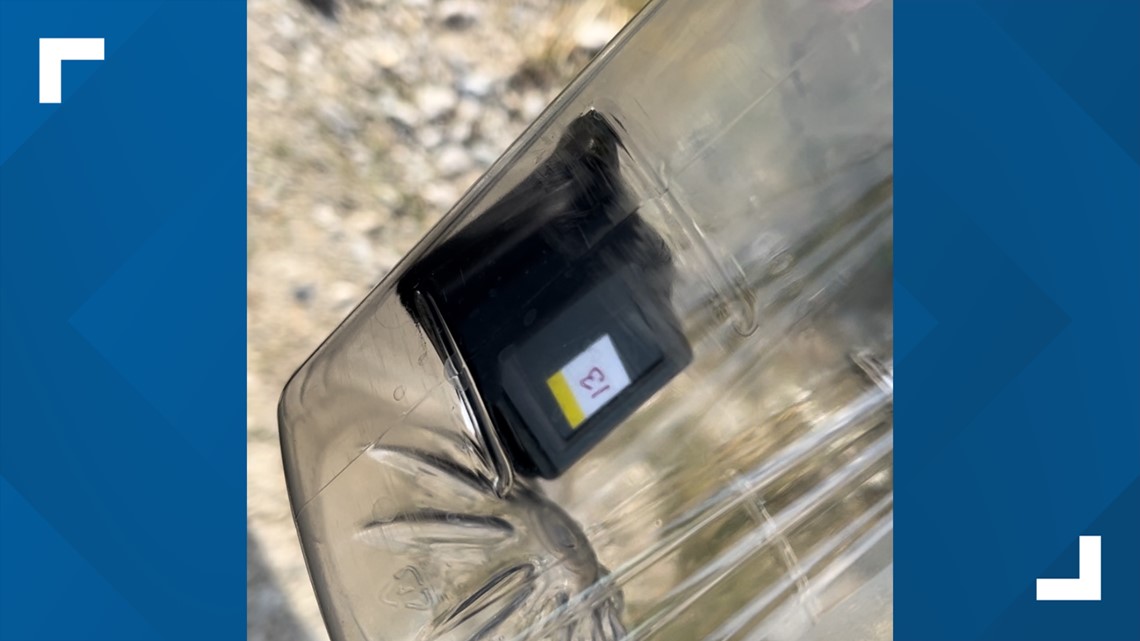
The tracking devices feature both GPS and Wi-Fi technology to transmit their location, so once each load of recycling was picked up by a recycle truck, 13 Investigates could then remotely track the location of each plastic bottle to see where it went.
13News also followed each truck with undercover cameras – and, in some cases, a drone – to document the recycled material’s journey and to help ensure the data transmitted by the electronic tracking devices was accurate.
Over a monthlong period, 13 Investigates tracked truckloads of recycling in Marion, Hamilton, Hendricks and Hancock counties – focusing on recycling picked up by both Republic Services and Waste Management. 13News did not notify either company that their trucks were being monitored until the undercover surveillance was complete.
Following Republic Services
Lindsey Bradshaw and her daughter Reis loaded up the recycle bin and rolled it to the curb for their bi-weekly pickup from Republic Services.
13 Investigates tossed in an electronic tracker housed in an old Gatorade bottle and waited outside the Bradshaw’s northeast side home to see what happened next.
“It makes me feel good to recycle, but I actually have literally no idea where it goes,” Bradshaw told 13News. “I’m not positive if it gets recycled at all.”
A Republic truck picked up the Bradshaw’s recycle bin just before 11:00 a.m. and 13News crews followed behind. We tracked the truck through more northeast side neighborhoods for almost 90 minutes before it merged onto I-465 near Castleton Square Mall and headed west.
About 10 minutes later, the truck exited at Michigan Road and headed further west on 96th Street. Shortly before 1:00 p.m., it turned down a long driveway and then pulled into a large property owned by Republic Services.

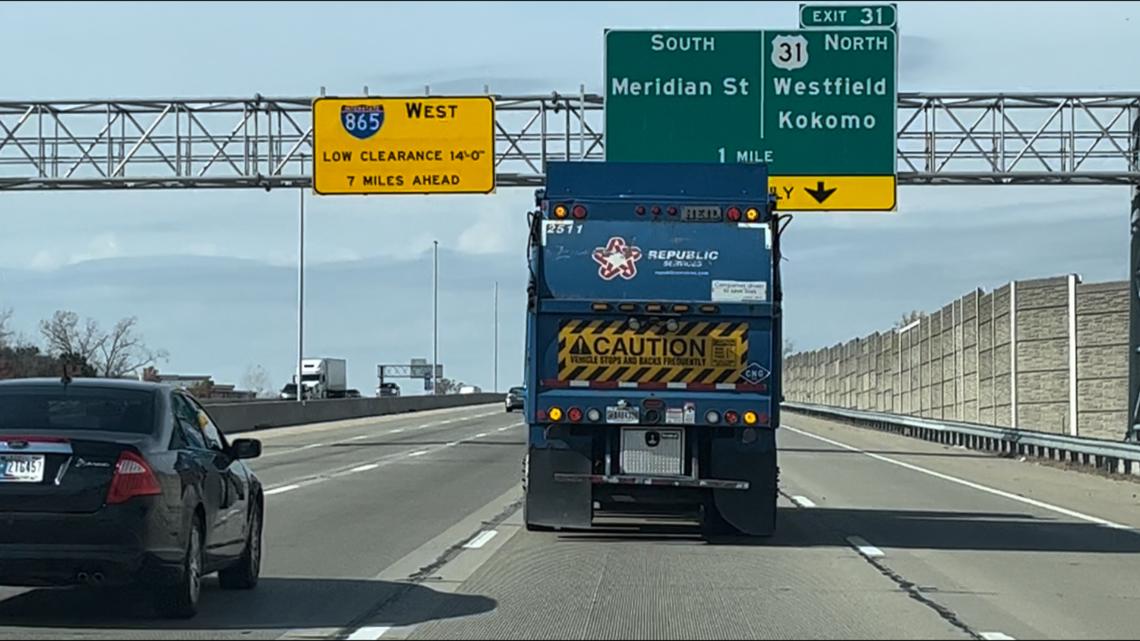
The property is home to a very large warehouse that features both a materials recovery facility (better known as a "MRF") that processes recycled items and a transfer station that serves as a collection point for trash that will later be shipped to a landfill.
13News continued to follow the truck carrying the Bradshaw’s recycling to see which area of the facility it was headed to. We watched it dump the entire truckload of recycling just inside a large door on the southwest side of the building – the area of the facility where material gets unloaded before it is loaded onto the recycling processing line.
Five minutes later, after the truck had dumped its contents and left the warehouse, the electronic tracker that 13 Investigates placed inside the Bradshaw’s recycle bin showed it was located right inside the MRF, in the same spot where we saw the truck empty its load.
A 13News undercover camera watched as a front loader then picked up materials that had been dumped on the floor of the MRF warehouse and carried the material in its bucket to the recycle processing line. Within 20 minutes, the tracker that 13 Investigates placed in the Bradshaw’s recycling stopped sending a signal. (Keep reading below to understand why.)
Based on what we observed with our undercover cameras and tracking devices, we can verify the materials inside the Bradshaw’s recycling did get processed at Republic’s recycling center on the northwest side of Indianapolis.
13 Investigates followed another Republic recycling truck after it picked up loads of curbside recycling along West 46th Street in Indianapolis. That truck also dumped its load in the exact same location inside Republic’s MRF, a finding that should reassure Republic customers that their recycling is going where the company says it is supposed to go.
See the “What happens inside the recycling center” section below to understand what takes place during the next step of the process.
Following Waste Management
Like the Bradshaw family, Matt Griffin is not sure where his recycling is going – especially after his local recycler, Ray’s Recycling, was purchased and taken over last year by a much larger national corporation, Waste Management.
“I hope it’s going to a recycling center, but it’s really just a question mark,” he told 13News. “I’m hoping for the best is what it’s coming down to.”
On trash and recycling day, a WM truck picked up Griffin’s trash. Two minutes later, a separate WM truck that looked nearly identical picked up Griffin’s recycling. A 13News electronic tracker was inside.
13 Investigates followed with undercover cameras and a drone as that truck then spent about two more hours picking up other recycle bins in Griffin’s neighborhood near Brownsburg.
From there, we followed the truck across Eagle Creek Reservoir to the highway. 13News tracked the truck as it exited near the airport and headed east, eventually watching as it slowly backed in to a large warehouse in an industrial complex off Raymond Street. After the truck left, the tracking device showed Griffin's recycling was inside the warehouse in an area that now contained a mountain of material that had recently been dumped there.

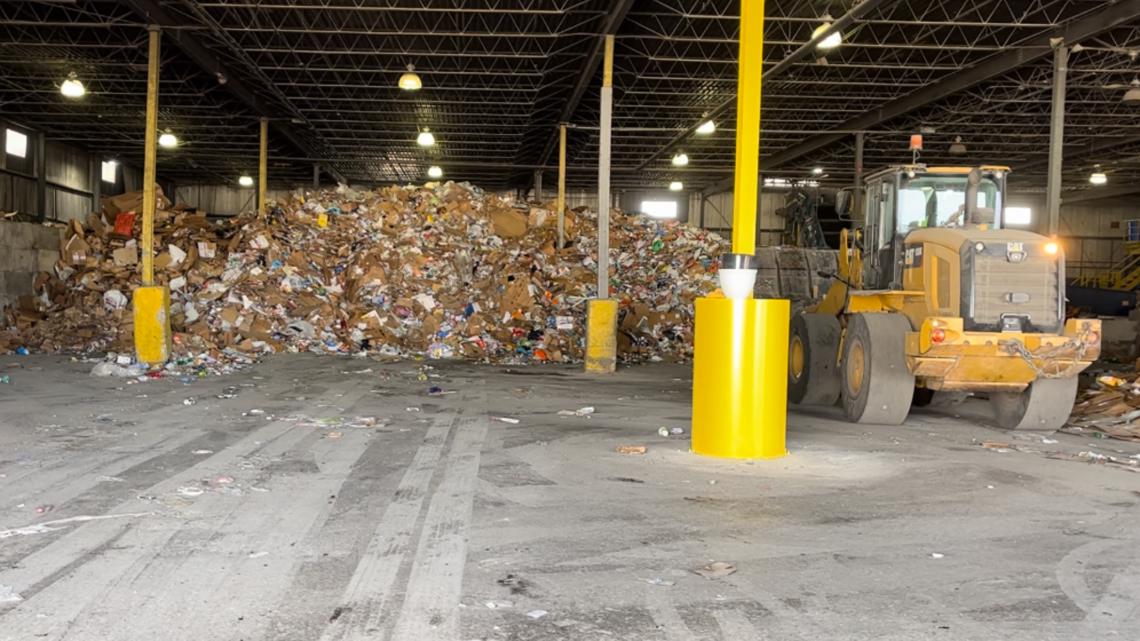
13 Investigates got video of the pile containing the electronic tracker, as well as video showing a front loader that was moving bucketloads of the material to a recycling sorting area. The tracker continued to send its location to 13News – showing that it was in the same spot – until it stopped sending a signal five days later.
Waste Management later confirmed the warehouse we visited is the company’s primary recycling processing center for curbside recycling in central Indiana. That Waste Management MRF processes recycling for nearly 140,000 homes, according to a company spokesman.
A tracking device placed inside the WM recycle bin of a 13News employee who lives in Westfield also ended up at the same recycling facility in Indianapolis, after first being dumped inside a WM transfer station in Whitestown, where it was then loaded onto a larger truck and transported to Indianapolis for sorting.
The undercover surveillance and tracking devices allow 13News to verify that the curbside recyclable materials that Waste Management picked up from the Bradshaws in Hendricks County and from the home of a 13News producer in Hamilton County were both processed at the WM recycling center on the west side of Indianapolis.
But what happens after a truckload of material is dropped off at the MRF?
Both Waste Management and Republic Services agreed to allow 13 Investigates to show what happens inside their central Indiana recycling facilities, providing further clarity about what happens to curbside recycling once it gets dumped inside their buildings.
What happens inside the recycling centers
13 Investigates spent more than five hours touring the Republic and WM warehouses where the vast majority of curbside recycling is processed in central Indiana.
In additional to recycling what is picked up curbside, those recycling facilities also process recycled materials that residents drop off at large community recycle bins placed in the parking lots of grocery stores, parks, municipal buildings, and other locations around town.
Once the piles of recycling are dumped onto the floor of the recycling centers, front loaders carry the material to a huge machine with a long series of conveyer belts.

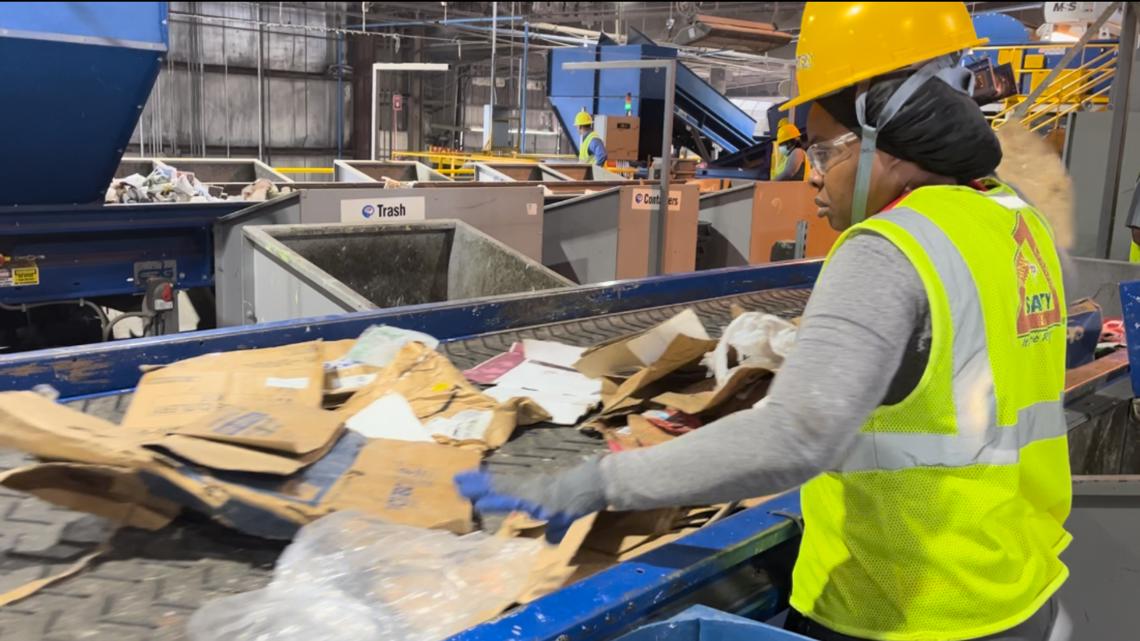
In the pre-sort area, staff members pull out items – such as plastic grocery bags, cement blocks and strings of holiday lights -- that could damage the conveyer belts and other equipment.
The single stream of mixed material then flows through a huge metal cylinder that has different size holes. Large pieces of cardboard pass through the cylinder while plastic, glass and paper falls through the holes to lower conveyer belts to get sorted.

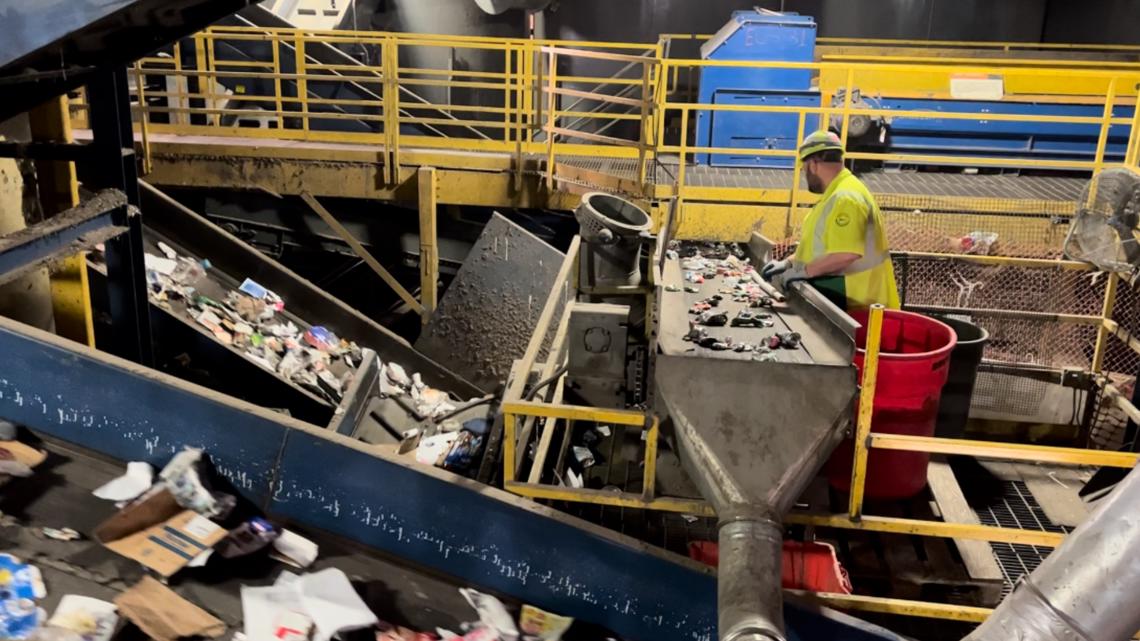
Optical sorters identify aluminum and plastic, which are diverted to their own separate areas.
A wheel with a powerful magnet catches metal cans, while glass is separated and crushed.
At Republic, another optical sensor sends messages to robotic arms hovering over the conveyer belt to grab and sort items that were previously missed.
Eventually, each type of material gets baled and shipped off to other companies to make new products. 13News saw semis loaded with cardboard headed to Valparaiso, Ind., and Henderson, Ky., to be recycled into new cardboard boxes, and a shipment of recycled plastic en route to Seymour, Ind., to become new water and soda bottles.

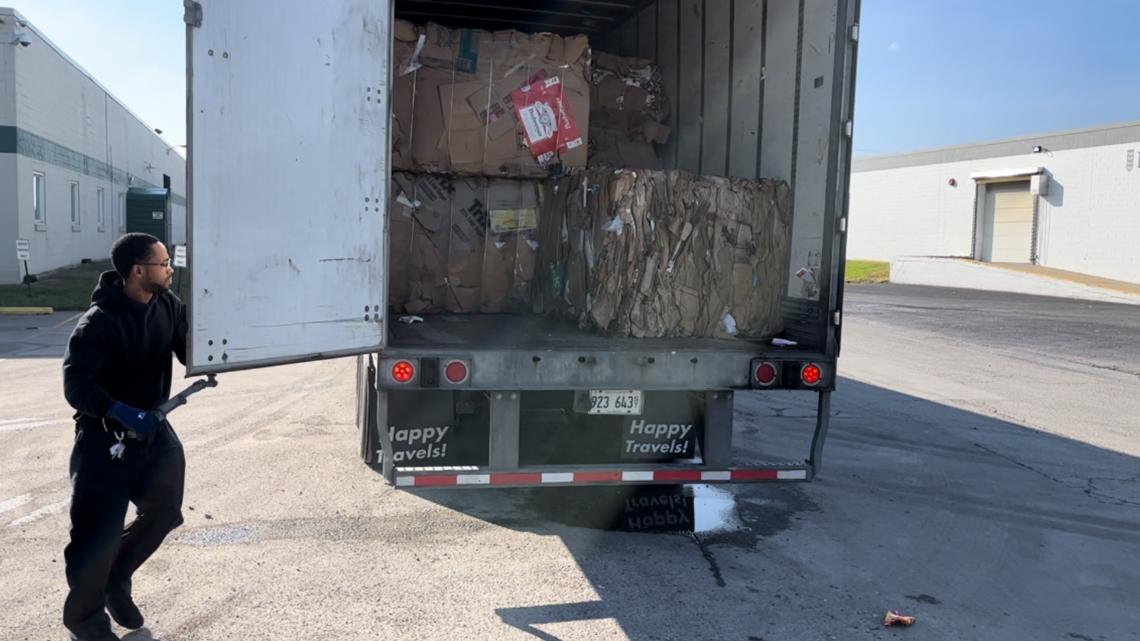
What happens inside the MRFs is a fast process – and a violent one.
As the recycling moves through a maze of buzzing machines, items on the conveyer belts are subjected at various points to spinning, launching, crushing and shredding. It’s an unfriendly process to an electronic device such as a GPS tracker, which explains why the 13News trackers stopped transmitting signals once they hit the conveyer belts.
Had the trackers (with batteries that can transmit a GPS or Wi-Fi signal for more than a week) continued to transmit their locations, it would have suggested the tracking devices did not actually pass through the recycling conveyer belts, raising suspicion that the materials in their recycle bins did not truly get processed and recycled. That did not happen with any of the trackers; they all appeared to have been destroyed while inside the recycling centers – exactly what would be expected when subjected to the harsh environment of the MRF.
When it comes to the loads of recycling tracked by 13 Investigates, supervisors at Waste Management and Republic say their processes worked as designed, yielding proof that items collected in curbside recycling bins in central Indiana are indeed recycled.
“They are truly 100% recycled,” explained Republic general manager Paul Cardinal while providing a MRF tour to 13News. “I gotta tell you, it does happen. It happens every day and it happens right here at our facility.
“If you want to pay for recycling service, it is absolutely going to get recycled,” added Aaron Johnson, a Waste Management area vice president who led 13News through the WM recycling facility.
Despite what 13 Investigates saw during this investigation, it's easy to understand why many people are skeptical about curbside recycling. What you see happening is not always what it appears to be.
“Why is that recycling truck pulling into a landfill?”
Debbie Horn contacted WTHR’s Verify team earlier this year to express doubt about her recycling. “Are we actually just paying extra fees to have the items thrown in the landfill?” she asked.
Tracking Horn’s recycling this month provided 13 Investigates with an unexpected surprise.
We placed a tracker in her recycle bin that had already been positioned at the end of her very long driveway. Ironically, from the end of the driveway Horn can easily see a gigantic hill that rises high above surrounding farm fields. That hill is a Waste Management landfill in Morristown that is clearly visible from miles away.

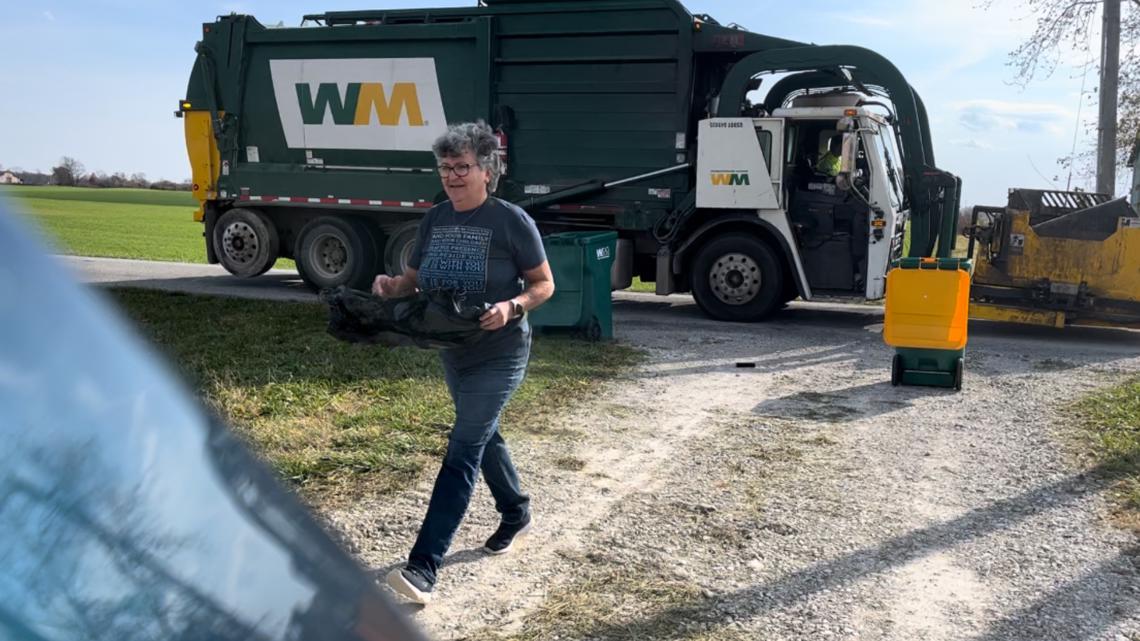
A Waste Management truck picked up Horn’s recycling at 2:00 p.m. 13News followed it as the truck crossed from Hancock County over the nearby border into Shelby County to collect recycling from more homes. Just after 2:30 pm, 13 Investigates cameras were rolling as the recycling truck pulled into the Morristown landfill.
13News continued to track the truck as it weighed in at the landfill weigh station. At that point, it would have been easy to jump to conclusions, but the undercover surveillance continued.
The truck drove down a winding road without climbing into the portion of the landfill where other trucks were dumping their contents. Instead, the truck made a U-turn and drove out the same road it entered, leaving the landfill without dumping anything and driving to a nearby WM transfer station where it parked for the night.
A signal from the electronic tracker showed it was still inside the truck when the vehicle pulled away the next morning before sunrise to collect curbside recycling at homes throughout Greenfield. The truck then returned to the same transfer station in Morristown, where the tracker indicated the contents of the recycle truck were then dumped inside the transfer station.

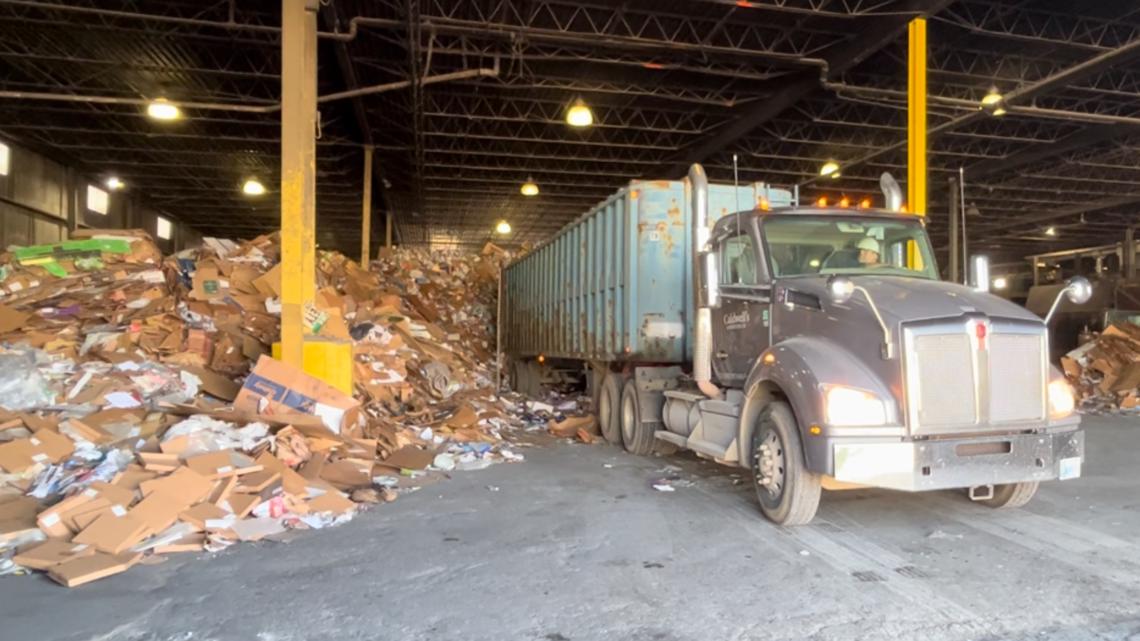
Two days later, 13 Investigates watched as a semi trailer full of recyclable material from the Morristown transfer station arrived at Waste Management’s Indianapolis MRF. It was dumped on the floor inside the facility to then be sorted through the recycle line.
The reality is both Waste Management and Republic Services have great incentive to recycle the materials they collect rather than send it to a trash heap.
Disposal at a local landfill costs the companies between $30 and $40 per ton. Recycling and selling the material can bring a significant profit.
Corrugated cardboard is currently selling for about $90 per ton, according to Waste Management. Recycled steel cans are worth $190 per ton. Clear plastics like milk jugs are selling for $530 a ton. And aluminum cans that come off the recycle line are now valued at $1,350 per ton.

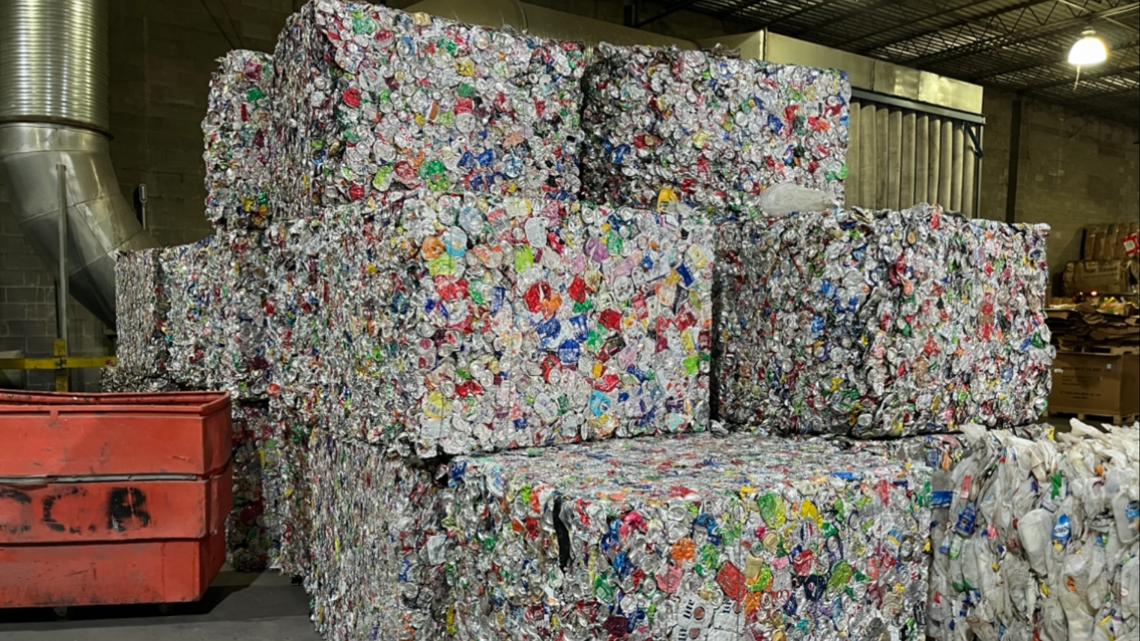
“These are very valuable aluminum bales,” Johnson said, pointing to large square stacks of soda and beer cans that had just been recycled at WM’s Indianapolis MRF. “Each one of these bales is about $1,300 in value. No way do I want that going to landfill!”
Um, you can’t recycle that!
Unfortunately, a lot of material picked up by WM and Republic does end up in a landfill – and it’s not their fault.
Folks put a lot of stuff into their bins that shouldn't be there: Bowling balls. Rolls of carpets. Garden hoses. Paint. Yard waste. Christmas decorations. Worn-out boots.
Stop it, people. Those cannot be recycled. But look at almost any mountain of recycling dumped by a recycling truck at a central Indiana MRF and you’ll find plenty of those items.
Many of those items pose a risk to the sorting equipment. More importantly, they also pose a risk to the people who work along the MRF sorting lines.
“Each time we have to reach onto the conveyer belt to remove something, that’s putting our workers at risk,” explained Johnson, who said lithium ion batteries are especially dangerous in the recycling process because they pose a fire risk.
Other things that may look like they can be recycled cannot be handled at the processing centers.

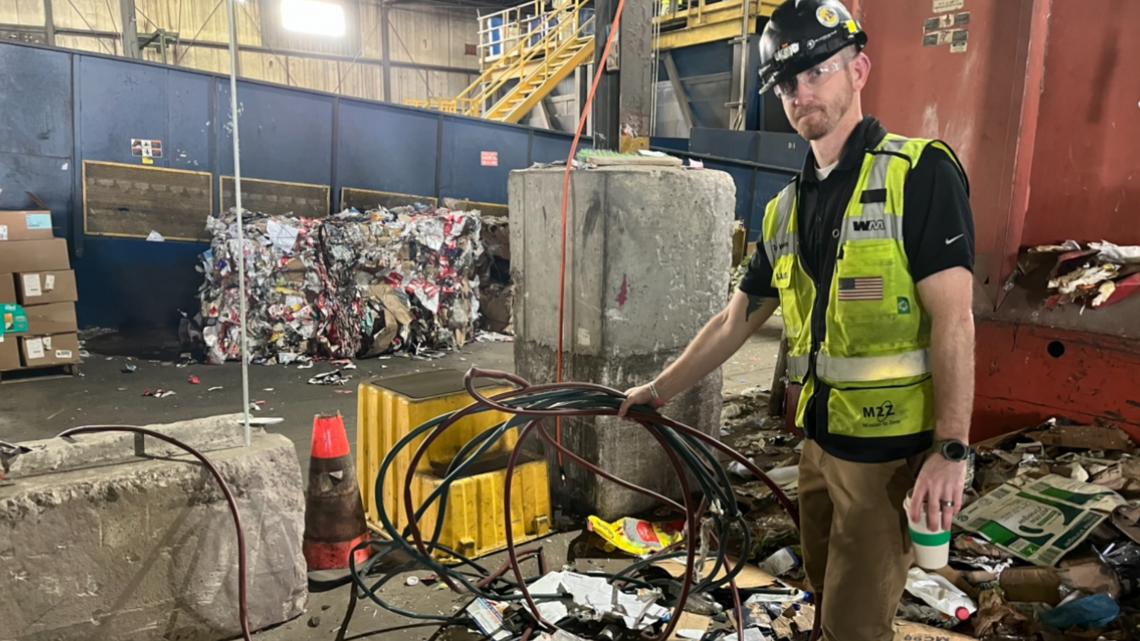
While 13News was visiting Waste Management’s Indianapolis recycling facility, district manager Zeke Werden picked up an electronic plastic toy that had just been unloaded by a recycle truck.
“That will get kicked out. We can’t recycle this,” Werden said. “Yes, this is made mostly of plastic, but look at those wires and metal screws inside. If you were to pull apart all of these pieces separately, you might be able to recycle the parts, but our machines can’t do that. The metal and wiring would contaminate a load of plastics.”
“People don't think about it when they're putting it in a container, and it comes here and we have to pull it out,” Johnson added. “That stuff does go to a landfill.”
It happens a lot.
Local recycling companies say up to 30% of the materials that Hoosiers put into our recycling bins cannot be recycled. Anything that reaches the end of a MRF’s conveyer belt without being sorted into a pile of recycled materials is headed to the trash pile, according to Tioni Burnett, operations manager at Republic’s Indianapolis recycling center.
Republic expects to process about 150 million pounds of materials picked up by its curbside recycling trucks in central Indiana this year. About 113 million pounds of that material will actually be recycled, according to Republic general manager Paul Cardinal.
That leaves about 37 million pounds (25%) of unrecyclable material to be buried in a landfill.
Processing and transporting all that trash during the recycling process increases operating costs for recycling companies which, in turn, must raise their rates to collect and process curbside recycling.
“Knowing what to throw is extremely important,” Cardinal said. “At the end of the day, we want to make sure we have the right items going into our recycling containers so they can be brought back here and processed and sent back out versus having to be processed and then taken directly to a landfill.”
The good news for families in central Indiana: most of the items placed in their recycling appear not to be headed to a landfill. After tracking from bin to bale, 13 Investigates can verify it is being recycled.
“That's great!” said Lindsey Bradshaw, who just learned the results of the 13News investigation. “Definitely makes me feel better.”
What to put in your curbside recycle bin (and what to keep out!)
Republic Services and Waste Management provided 13News with helpful information to help you understand what items should go in your recycle bin and which items to leave out.
The chart below summarizes the companies’ recommendations, followed by a Q&A section with some of the most frequently asked questions about how to recycle properly. You can also find additional recycling information at https://recyclingsimplified.com/ and https://www.wm.com/us/en/recycle-right.

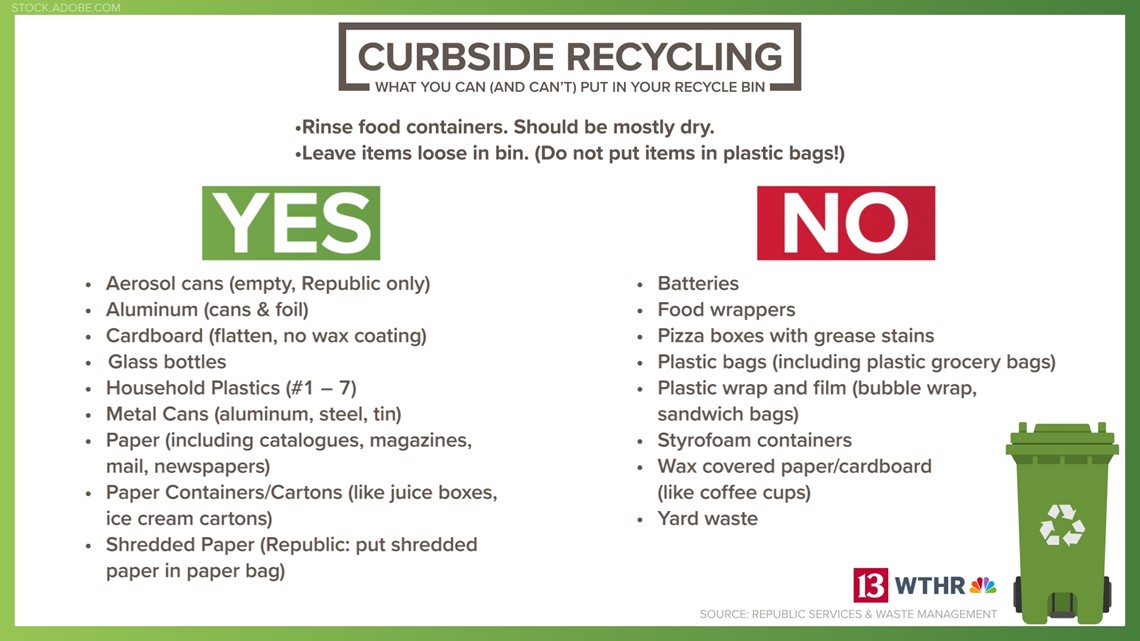
How dry do the bottles/cans really have to be? Can I just rinse and go?
Bottles and cans do not need to be totally dry. Just rinse and shake out any excess water. Both Republic Services and Waste Management say you do not have to dry the inside.
What if I leave the last few ounces of liquid in the bottle, is that really a problem?
Yes. The liquid can impact whether the bottle is sorted properly at the recycling center and end up getting recycled. Do not leave liquid in a bottle. A few drops of water after you rinse is fine. Make sure to rinse out any residue, like peanut butter or laundry detergent.
Do I need to take the paper labels off cans or peel the paper or plastic labels off jars and bottles?
No. You do not need to remove labels or the sticky residue they leave behind.
What about cardboard?
Regular cardboard can be recycled, as long as it does not have a shiny exterior coating or a layer of protective film, like some yard signs. You do not need to peel off address or other labels. But, you should flatten the cardboard item.
What about the packages that have a cardboard back and plastic front?
Separate the plastic from the cardboard before you put it in the recycle bin. Do not leave different types of recyclable items attached to each other.
I thought I could recycle batteries.
Batteries do not go in curbside recycling. Check with your municipality or a hardware store for a drop-off location that accepts batteries and other hazardous waste.
Can I recycle wrapping paper?
Plain, uncoated wrapping paper and plain paper gift bags can be recycled. If it is glossy, has glitter or is made with foil, it goes in the trash. Republic Services has this site posted about holiday recycling.

